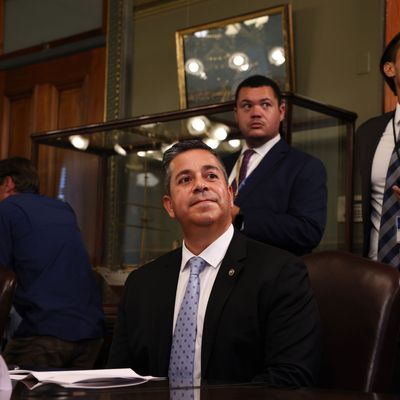
We learned Tuesday that New Mexico senator Ben Ray Luján suffered a stroke last week. The very good news is the 49-year-old senator, who checked himself into the hospital after experiencing dizziness and fatigue, is expected to make a full recovery.
But the timetable for recovery from strokes is difficult to predict in the early days. And Luján’s absence from the Senate during what may be the final months of a Democratic trifecta (given the high odds the party will lose control of the House in the 2022 midterms) creates some immediate problems for Senate Majority Leader Chuck Schumer and President Joe Biden, who was already struggling to get key elements of his agenda through the upper chamber.
For the moment, Luján’s absence means that in fully attended party-line votes, Democrats are at a one-vote disadvantage, making Vice-President Kamala Harris’s tie-breaking vote irrelevant. This particular week, Republican Senator Mitt Romney is absent due to a positive COVID-19 test, so business can proceed normally until he returns. After that, some items that already required some bipartisan support (e.g., an appropriations bill required to avoid a government shutdown on February 18, an Electoral Count Act fix, and economic “competitiveness” legislation) should not be materially affected. But controversial votes requiring a Democratic majority will be problematic; that could include a final Build Back Better bill, if Democratic Senator Joe Manchin allows it, and at some point a Supreme Court nomination.
The Senate has worked through extended absences with major legislative impact before, most recently when Republican Senator John McCain was out for treatment of brain cancer from December 2017 through much of 2018 and most famously when Ted Kennedy’s absence in 2009 for a similar ailment denied Democrats the Senate supermajority they needed to move the Affordable Care Act (ultimately completed via the budget-reconciliation process). There’s some talk now that, at least on minor matters, Senate Republicans will not try to exploit Luján’s absence to muck up the works, as one senator told the New York Times.
“My hope is that we all love each other enough to just slow down, do work that we can get done that won’t be affected by his being gone and get him the hell back here when it’s safe,” said Senator Kevin Cramer, Republican of North Dakota. “Gosh, just the nicest guy in the world.”
But in this Congress, Republican partisanship has regularly trumped love or any other positive sentiment, so Democrats are surely praying extra hard for Luján’s speedy recovery and return.






























